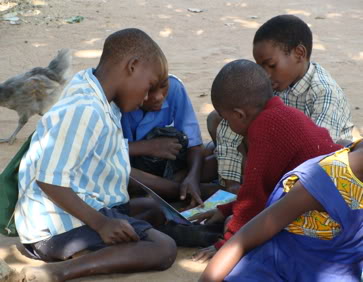Complementary books are important to young and beginning readers!
Many agree as to the importance of learning materials as learning materials are effective in raising achievement. So much, in fact, that textbooks and supplementary learning materials are the norm in countries like the USA and are becoming a pervasive part of classrooms in developing countries. While scholars recognize the importance of learning materials for reading development, access to learning materials in many developing countries, especially reading materials, is limited. Research has demonstrated the importance of book floods in improving children’s writing, listening comprehension, and related language skills, which are slow to develop under traditional styles of teaching in developing countries (see the work of Warwick Elley). Unfortunately, not only are reading materials not found in many classrooms in developing countries, many of these materials present challenges related to quality. They are often poorly designed, contain factual inaccuracies, do not support higher-level thinking, do not represent the lived experiences of the children using them, and reinforce gender stereotypes.

Because complementary reading materials are important to young readers, the Read Malawi program designed and developed 180 high quality complementary reading materials as a way of supporting reading skill development, love for reading, and, ultimately, a culture of readers. The 180 books developed under the Read Malawi program were authored at the Malawi Institute of Education (MIE) and the Blantyre Teacher Training College and the Lilongwe Teacher Training College in Malawi. Authors of these local books were pre-service and in-service teachers, lecturers, and government officials. Authors wrote, revised and field-tested their books with learners and curriculum specialists revised and edited the books.
The Read Malawi books were representative of the distinctiveness of Malawi and were based on experiences of young children. The books covered concepts in life skills, mathematics, and sciences. The books supported personal, moral and social development and demonstrated the importance of cultural practices and traditional folklore. Finally, the books supported the empowerment of girls.
The books drew from several teaching formats that would support teachers in pedagogical approaches. Included in these materials were Guided Reading books (written at learners’ instructional levels and are for learners to read in the company of a more skilled reader, namely their teacher in small group settings) and Read Aloud books (books that teachers read orally to learners). Additionally, we designed two alphabet books and accompanying alphabet posters. All materials were written in both Chichewa and English. The books were printed at Kris Offset and Uniprint.